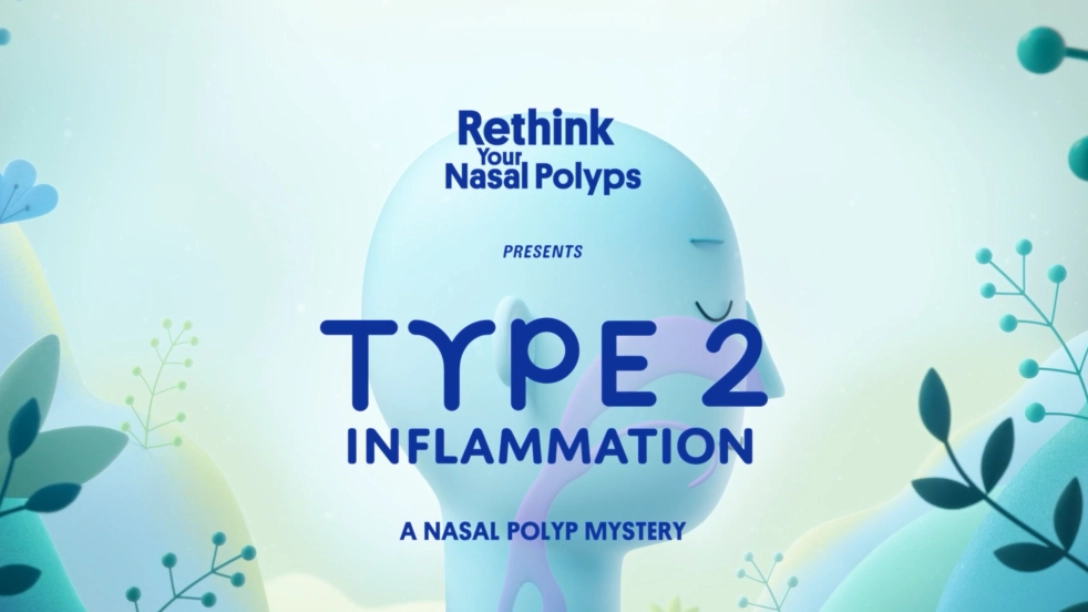Understanding your Chronic Nasal Polyps (CRSwNP)
Chronic Nasal Polyps is often misunderstood and underestimated. And if you have it, you'll already know that it affects your health and well-being in many different ways.3
Here you can find out more about what causes it, typical symptoms, and possible triggers. Getting to know your condition better is the first step to gaining control over CRSwNP.
What is CRSwNP?
Chronic Nasal Polyps is a condition where the tissue in your nasal passages is inflamed for a long time.2
If you are living with CRSwNP, it's common for your nose and face to be affected.1
These growths can cause a variety of symptoms that may impact your health and well-being.
Inflammation can be detected systemically even if you only feel it as sypmtoms in your nose.
Key facts
![]()
About 3% of people worldwide are living with CRSwNP13
![]()
It's more prevalent in adults and more uncommon in children.4
![]()
Many people living with CRSwNP have other conditions like asthma and allergies (comorbidities)1
The link between Type 2 inflammation and CRSwNP
Inflammation is your body's natural response to injury, illness, or something that doesn't belong in your body, like a virus.5
Type 2 inflammation, which may be causing your nasal polyps and other symptoms of CRSwNP, often starts with a 'trigger' such as infection, allergy, or irritant that can cause your nasal passages and sinuses to swell and thicken. Even when this trigger goes away, Type 2 inflammation may persist. Your body keeps trying to fight it, which eventually causes damage.6
Type 2 inflammation may cause your nasal polyps and the other symptoms of CRSwNP.
By treating a cause of the condition, many symptoms can be reduced. If Type 2 inflammation is not addressed, your symptoms may return or get worse.5
No one knows exactly why some people get CRSwNP. It's likely to be caused by a combination of different factors: genetic, environmental, and immune-related.7
CRSwNP is a chronic condition, so it may not go away on its own but needs ongoing care and management to keep it under control.6
There are some conditions that can co-exist with CRSwNP. These are known as comorbidities. They may share common causes, or be related to the way your immunity responds to triggers. Asthma - the chronic inflammation in CRSwNP may make existing conditions like asthma worse.
Nasal allergic reactions - When the nose's protective barrier breaks down in CRSwNP, it increase the chances of allergic reactions or infections.1
Recognizing the symptoms of CRSwNP
If you're living with CRSwNP, you probably have experienced symptoms like a constantly runny nose, nasal congestion, or even the loss of your sense of smell.7
Frequency and severity of symptoms can vary from person to person. As well as causing physical discomfort they can also have a big impact on your quality of life, mental health and well-being.10
Most common symptoms of CRSwNP6:
Blocked nose (nasal congestion)
Runny nose (nasal discharge)
Decreased/lost sense of smell and taste (hyposmia/anosmia)
Facial pain or pressure
Post nasal drip
Headache
Snoring or sleep disturbances
Fatigue
Nosebleeds
Check your symptoms
Our handy symptom checker can help you assess whether your CRSwNP is under control. It's a simple questionnaire that asks you about your symptoms and how they're affecting you. You can then share your results with your doctor and discuss the adapted treatment and care.
Triggers, like the ones listed below, may irritate your nasal passages and make your nasal polyps worse, so avoiding them may help reduce your symptoms7:
- Tobacco smoke
- Incense
- Aspirin and other similar drugs called 'nosteroidal anti-inflammatory drugs' (such as ibuprofen and naproxen sodium)
- Chemical fumes
- Dust or debris
Getting your CRSwNP diagnosis can be a rollercoaster. CRSwNP is often misdiagnosed or overlooked because many of the symptoms are similar to other conditions like acute rhinosinusitis, allergies, the common cold, or the flu.7
Also because it's a chronic condition that develops gradually, some people often find ways to live with their symptoms without seeking medical attention, despite the discomfort and frustration they cause.13
The diagnosis of CRSwNP typically involves a combination of1:
- Clinical evaluation
- CT scan of your nose and sinuses
- Nasal endoscopy (a thin tube with a tiny camera and a light that's inserted into the nose)
Being aware of the signs and symptoms of CRSwNP could help you get the support you need more quickly.12
- Mullol & al. Chronic Rhinosinusitis with Nasal Polyps: Quality of Life in the Biologics Era. Journal of Allergy and Clinical Immunology: In Practice. 2022;10(6): 1434-1453.
- Laidlaw & al. Chronic Rhinosinusitis with Nasal Polyps and Asthma. Journal of Allergy and Clinical Immunology: In Practice. 2021;9(3):1133-1141.
- Claeys & all. Patients Unmet Needs in Chronic Rhinosinusitis with Nasal Polyps Care: a Patient Advisory Board Statement of EUFOREA. Frontiers in Allergy. 2021;2:1-9. doi: 10.3389 /falgy .2021 .761388.
- Hop. Do Adult Forms of Chronic Rhinosinusitis Exist in Children and Adolescents? Sinusitis. 2017;2(7):1-9.
- Cleveland Clinic. Inflammation. 2021. https://my.clevelandclinic.org/health/symptoms/21660-inflammation?view=print
- Cleveland Clinic. Nasal Polyps. 2025. https://my.clevelandclinic.org/health/diseases/15250-nasal-polyps
- Allergy & Asthma Network: What is Chronic Rhinosinusitis with Nasal Polyps (CRSwNP)? https://allergyasthmanetwork.org/health-a-z/chronic-rhinosinusitis-with-nasal-polyps-crswnp/
- Ramkumar & al. Considerations for shared decision-making in treatment of chronic rhinosinusitis with nasal polyps. Frontiers in Allergy. 2023;1-13. Di 10.3389/falgy.2023.1137907
- De Corso & al. Chronic Rhinosinusitis with Nasal Polyps: A Survey on Routine Management and Evaluation of Disease Control in Practice. Journal of Personalized Medicine. 2023;13(1531):1-10.
- Bandoim. Coping With Nasal Polyps. VeryWellHealth. 2021.
- Cleveland Clinic. Rhinitis Medicamentosa. 2022. https://my.clevelandclinic.org/health/diseases/23393-rhinitis-medicamentosa
- Asthma and Allergy Foundation of America. Life with Nasal Polyps. 2024. https://aafa.org/asthma-allergy-research/our-research/life-with-nasal-polyps-crswnp/
- Teeling & al. Nasal polyp syndrome: a patient-centred term for CRSwNP by EUFOREA. Frontiers in Allergy. 2024, 1-6. DOI 10.3389/falgy.2024.1372919.
- Hwee & al. The chronic rhinosinusitis with nasal polyp patient journey in the United States and Europe. Allergy, Asthma & Clinical Immunology. 2024;20:17;1-4.
Sanofi Belgium, MAT-BE-2500577. V.1. 05/2025





